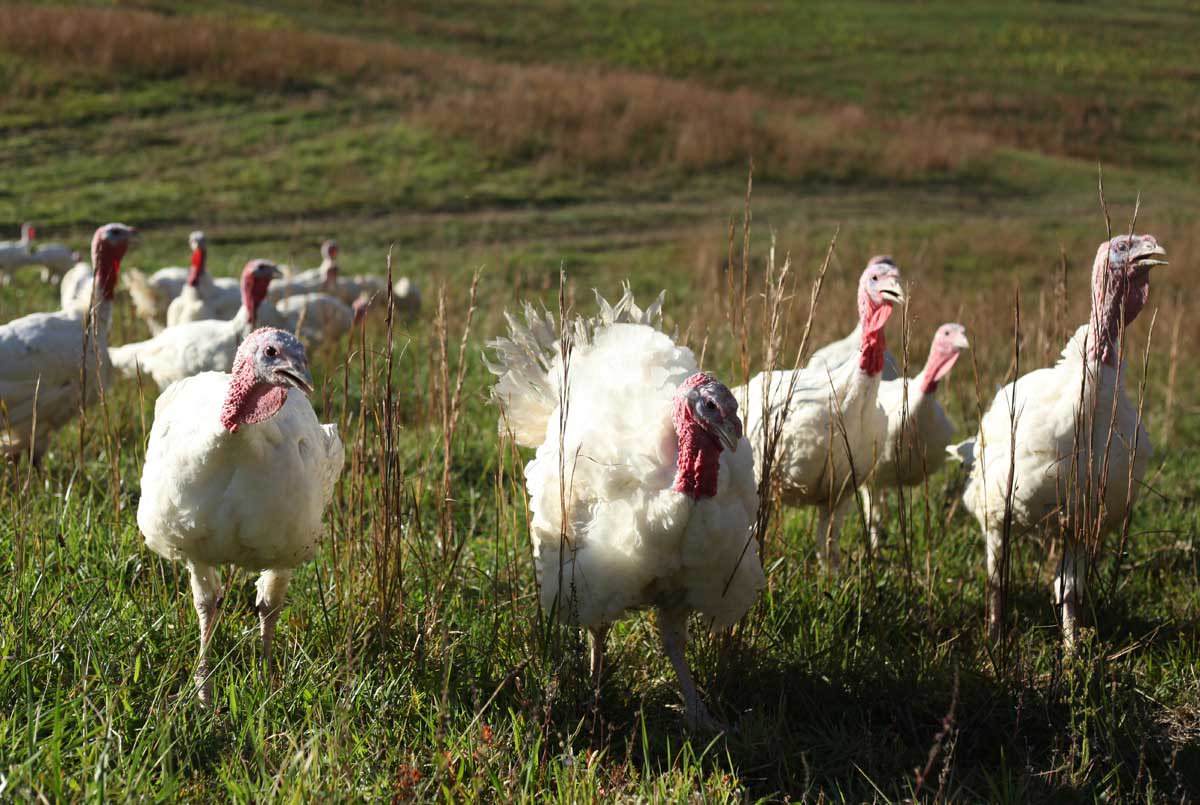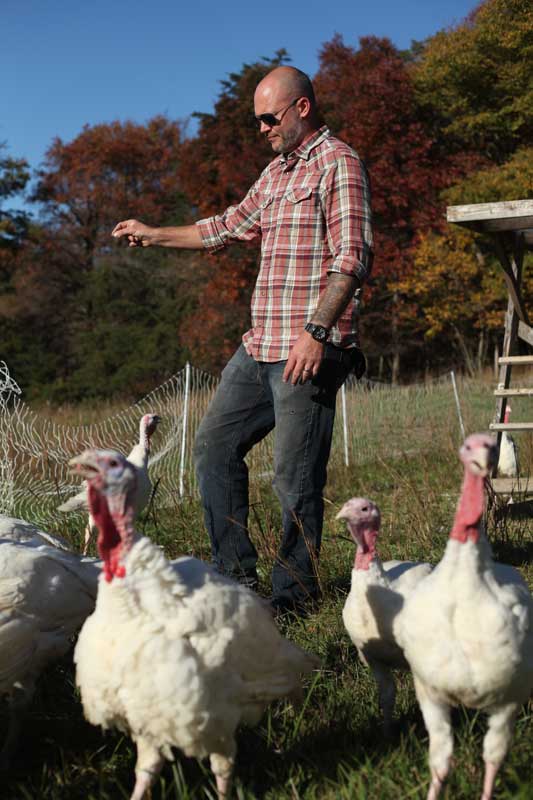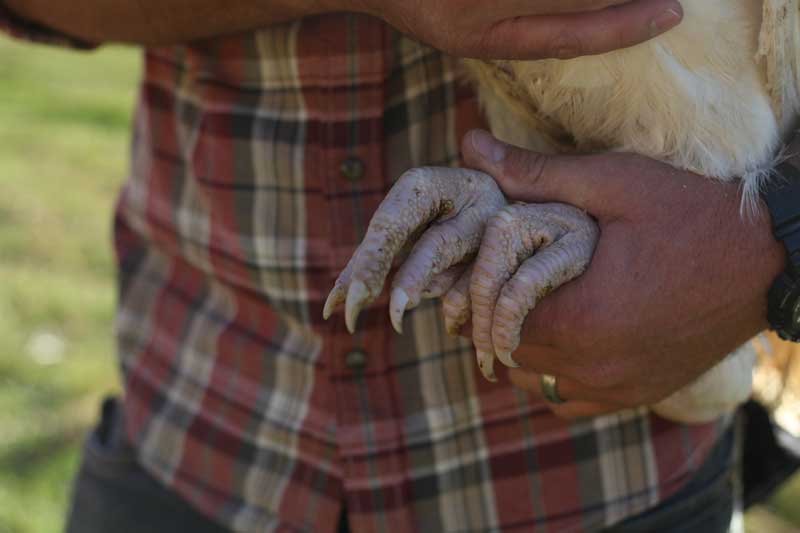From Factory Farmer to Something Much Smaller: The Lengthy Roots of Long Roots Farm
The grandson of one of Virginia’s first – and eventually most major – mass-commercialized turkey farmers steps out on his own.
From Factory Farmer to Something Much Smaller: The Lengthy Roots of Long Roots Farm
The grandson of one of Virginia’s first – and eventually most major – mass-commercialized turkey farmers steps out on his own.

“A little over a year ago we posted an ad on Craigslist saying we wanted land to farm,” says Charles. “We answered the first response and, when we came out and looked at the place, we fell in love.”
For him, nabbing this perfect plot of land marked the culmination of a life-long transition from full-blown factory-farmer to owning his own grass-roots operation.
The twist? Charles Long was raised by the son of Jim Long, founder of Virginia’s first – and eventually most major – mass-commercialized turkey operation. After raising turkeys free-range for years – on various plots of land he owned and leased in the Meadowview area – Jim realized that he could outfox Old Man Winter and predators via constructing heated houses. In 1942 Jim Long began raising his birds indoors.
“My grandfather was a true pioneer,” says Charles. “He was one of the first farmers to start raising birds inside.”
By the early 1960s, Jim was so successful he’d incorporated his turkey farming business under the name Franwood Farms, and, with the savvy of a corner-office entrepreneur, purchased subsidiary companies – like a truck dealership to cut Franwood’s transportation costs, a construction company to help lessen the expense of its expansion, a butchery to process the meat, and a packing plant to, well, pack it – thereby controlling economic gaps other farmers accepted as simply the “cost of doing business.” Franwood grew swiftly, supplying poultry to major metropolitan hubs – like Washington, D.C., Boston, and New York City – throughout the eastern seaboard.
As the scion of what was at once a family farm and corporate agricultural powerhouse, Charles Long spent his youth and early career immersed in the culture of big agro-business. Then, two years ago, in 2013, he decided to make a change.
“I wasn’t happy doing what I was doing,” says Charles. “I felt detached from the natural world.”
By watching the ongoing success of the slow-foods movement – as embodied on the front-end by Joel Salatin, or expressed on the back by Barbara Kingsolver’s best-selling farm-memoir, Animal, Vegetable, Miracle – Charles was inspired to apply his own expertise to sustainable farming.

The shift was huge. With Long Roots, Charles committed to a policy of naturalness. Whether it be turkeys, chickens, ducks, sheep, cows, or Lucy, the sheep-herding donkey, all the Long Roots animals are raised without antibiotics, are predominantly grass-fed (locally sourced, non-GMO feed is supplemented), and completely free-range.
“We fence in the small animals at night to keep out coyotes and predators,” says Charles. “And we don’t clip the wings of our birds.”
“I think it’s a happier method of farming. I know I feel happier, and I think the animals are happier too.”
When Charles opens the gate of a solar-powered electric enclosure housing around 50 soon-to-be-Thanksgiving turkeys, this last point is quickly proven. The maturing birds disperse in a flock, go pecking and strutting about the pasture, stretching their wings and taking brief flights. Contrary to what you’d think, they don’t flee or wander too far. In fact, within minutes they’re back at the enclosure, gathered about the Longs, curiously cocking their heads.
“I think it’s a happier method of farming,” says Charles. “I know I feel happier, and I think the animals are happier too.”
For the time being, while he grows Long Roots’ various herds and customer base, Charles is still working for Franwood. At present, these time constraints are limiting, but in the next year or two, Anna and Charles plan to commit to running Long Roots full-time.
“For an operation as new as we are, I think we’re pretty successful,” says Charles. “[The farm] is paying for itself right now… [and] going full-time would push it over the hump, because we would have more time to take everything to the next level.”
At present, Long Roots sells only through their website, word of mouth, and through ads posted on Craigslist. With additional time devoted to the operation, the Longs would be able to cultivate relationships with local markets, set up booths at farmers markets, and look to contract with local and regional restaurants. However, while it all sounds easy, there have been, and remain, some substantial hurdles.

“So far the biggest challenge has been taking the ‘next step,’” says Charles. “Each addition to the farm has been a big decision for us. One, because you want it to be successful. And two, because it’s a financial strain with such small margins when you first start up. It’s just like any other business when you start; you literally put your all into it.”
Charles identifies “marketing and meeting new customers” as the two most challenging aspects he faces when shifting to full-time. “We need to put ourselves out there more and meet more customers,” he says. “We’ll have to find a platform that fits us just right.”
In other words, to fully make the leap-of-faith from mass to small-scale, Long Roots will have to increase its local and regional brand presence, ensuring that would-be customers – the kind of people who care about the slow-food movement and are willing to pay higher prices for the higher quality meats – know who they are and what they’re all about.
“We’re not looking to get huge,” explains Charles. “But we would like to be totally focused on Long Roots, and have the farm support us and eventually maybe a few other helping hands.”
And while the prospects of all this are surely exciting, Charles says that once he makes the move, there’s a lot he’ll miss about working at Franwood.
“I really enjoy working with my family,” he says. “It’s definitely trying at times figuring out relationships and work at the same time, but it’s rewarding to accomplish something with family. I’ll miss that.”
When asked what his grandfather, Jim Long, thinks of all this, Charles tells the story of the 95-year-old’s visit to the Long Roots.
“He was amazed we were doing things the way he’d done them back in the ’40s,” says Charles. “He said he was glad there was a market for what we were doing and encouraged us to grow our operation. Get bigger, he told us. And that’s exactly what we intend to do.”
Follow us
This work is licensed under a Creative Commons Attribution-NoDerivatives 4.0 International License.
Want to republish a Modern Farmer story?
We are happy for Modern Farmer stories to be shared, and encourage you to republish our articles for your audience. When doing so, we ask that you follow these guidelines:
Please credit us and our writers
For the author byline, please use “Author Name, Modern Farmer.” At the top of our stories, if on the web, please include this text and link: “This story was originally published by Modern Farmer.”
Please make sure to include a link back to either our home page or the article URL.
At the bottom of the story, please include the following text:
“Modern Farmer is a nonprofit initiative dedicated to raising awareness and catalyzing action at the intersection of food, agriculture, and society. Read more at <link>Modern Farmer</link>.”
Use our widget
We’d like to be able to track our stories, so we ask that if you republish our content, you do so using our widget (located on the left hand side of the article). The HTML code has a built-in tracker that tells us the data and domain where the story was published, as well as view counts.
Check the image requirements
It’s your responsibility to confirm you're licensed to republish images in our articles. Some images, such as those from commercial providers, don't allow their images to be republished without permission or payment. Copyright terms are generally listed in the image caption and attribution. You are welcome to omit our images or substitute with your own. Charts and interactive graphics follow the same rules.
Don’t change too much. Or, ask us first.
Articles must be republished in their entirety. It’s okay to change references to time (“today” to “yesterday”) or location (“Iowa City, IA” to “here”). But please keep everything else the same.
If you feel strongly that a more material edit needs to be made, get in touch with us at [email protected]. We’re happy to discuss it with the original author, but we must have prior approval for changes before publication.
Special cases
Extracts. You may run the first few lines or paragraphs of the article and then say: “Read the full article at Modern Farmer” with a link back to the original article.
Quotes. You may quote authors provided you include a link back to the article URL.
Translations. These require writer approval. To inquire about translation of a Modern Farmer article, contact us at [email protected]
Signed consent / copyright release forms. These are not required, provided you are following these guidelines.
Print. Articles can be republished in print under these same rules, with the exception that you do not need to include the links.
Tag us
When sharing the story on social media, please tag us using the following: - Twitter (@ModFarm) - Facebook (@ModernFarmerMedia) - Instagram (@modfarm)
Use our content respectfully
Modern Farmer is a nonprofit and as such we share our content for free and in good faith in order to reach new audiences. Respectfully,
No selling ads against our stories. It’s okay to put our stories on pages with ads.
Don’t republish our material wholesale, or automatically; you need to select stories to be republished individually.
You have no rights to sell, license, syndicate, or otherwise represent yourself as the authorized owner of our material to any third parties. This means that you cannot actively publish or submit our work for syndication to third party platforms or apps like Apple News or Google News. We understand that publishers cannot fully control when certain third parties automatically summarize or crawl content from publishers’ own sites.
Keep in touch
We want to hear from you if you love Modern Farmer content, have a collaboration idea, or anything else to share. As a nonprofit outlet, we work in service of our community and are always open to comments, feedback, and ideas. Contact us at [email protected].by Eric J. Wallace, Modern Farmer
November 25, 2015
Modern Farmer Weekly
Solutions Hub
Innovations, ideas and inspiration. Actionable solutions for a resilient food system.
ExploreExplore other topics
Share With Us
We want to hear from Modern Farmer readers who have thoughtful commentary, actionable solutions, or helpful ideas to share.
SubmitNecessary cookies are absolutely essential for the website to function properly. This category only includes cookies that ensures basic functionalities and security features of the website. These cookies do not store any personal information.
Any cookies that may not be particularly necessary for the website to function and are used specifically to collect user personal data via analytics, ads, other embedded contents are termed as non-necessary cookies.